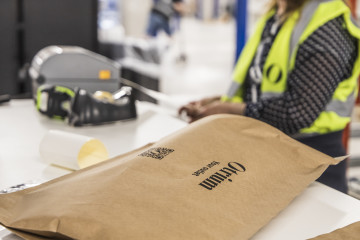Conscious
Otrium’s plastic-free shipping pilot

Everyone who takes an active step towards sustainable living is working towards the common goal – which is to preserve our planet. It can be in the form of being a more conscious shopper and avoiding overconsumption.
8 DECEMBER 2022
Waste and excess inventory are built into the fashion industry’s model. Not only is waste created during the manufacturing process, but a huge part also comes from packaging and shipping practices. Poly bags play a part in the waste that is created, so we want to find a solution together with you!
Quick glance: The pilot
What: All orders containing a single item will be shipped without a poly bag in a recycled paper envelope
Why: Otrium will reduce plastic waste by keeping the poly bags in the loop
How: By reusing or recycling the poly bags into high-quality material
When: Until January 2023
What you can do: Submit feedback directly to [email protected]
A short story behind plastic
A poly bag is a plastic bag around a fashion item that protects it from dirt and water which they possibly encounter during their shipment and in warehouses. Sounds great, doesn’t it?
These plastic bags are great for protecting fashion items, however, plastics are harmful to our environment. Plastic sticks around in the environment for ages, threatening wildlife and spreading toxins. Plastic also contributes to global warming. Almost all plastics are made from chemicals that come from the production of planet-warming fuels (gas, oil, and even coal).
Plastic is a collective name for multiple materials and compounds that each have unique properties. You might have heard about PET (Polyethylene Terephthalate) which is often used for soda bottles or polyester which can be found in the composition of many fashion items these days.
Many types of plastics can be recycled at a high-quality level. This can be done only by recycling the same type of plastic in one stream. Unfortunately, plastic waste is collected often as one waste stream rather than separating the different types of plastics. As it’s difficult to sort these plastics after collecting them, the result is recycling to a downgraded material in most cases.
The majority of poly bags in the fashion industry are made from a plastic material called LDPE (low-density polyethylene). Hundreds of billions of polybags are produced for the fashion industry every year, and it is estimated that most of them go to waste. To recycle the poly bags on a high-quality level, they should be sorted and recycled as a separate stream of LDPE.
Otrium wants to make sure that the plastic of the poly bags stays in the loop and keeps its quality. Either by reusing the poly bags or recycling them into new high-quality material. We don’t want to put the burden of recycling the poly bag on our members. Instead, we want to keep the bags in our warehouse and in our loop. By taking off the poly bag before shipping we can create the potential of a waste stream where the poly bags can be reused or recycled into high-quality LDPE material again.
Interesting fact: The poly bags of Otrium are made out of 100% recycled LDPE.
Our responsibility
At Otrium, we’re constantly working on making the fashion industry smarter and less wasteful. It’s our job to keep improving our practices in order to become a more conscious platform. Being aware of the environmental impact of plastics, we want to take responsibility and keep them in the loop. Empowered by our members who expressed their openness to receive items without a poly bag, we want to test ways of plastic-free shipping.
The purpose of this pilot is to reduce our plastic waste and to get a step closer to closing. We will be removing the poly bag from the items right before shipping them to you. This way we keep the poly bags in our warehouse which makes it possible to reuse or recycle them ourselves. The poly bags we will keep, keep their value since they are recycled with the same type of plastic. This will ensure high-quality plastic recycling.
We will collect customer feedback and evaluate if shipping with a paper envelope is enough coverage to secure the item shipped. Only together with our members, we can figure out new ways of plastic-free shipping and improve our practices.
Want to know more? Read our FAQ here!
More from Otrium
See all articles
Conscious
We are (officially) fur free
We’re on a journey to make fashion smarter, giving fashion-lovers the best possible online retail experience and making sure every item of clothing is worn. Going forward, we’ll be sharing more about our conscious roadmap and responsible choices.Throughout the fashion industry, 12% of the garments that are produced stay unsold.Our purpose is: All Clothing Should Be Worn.We’re tech-enabling designer brands to find an owner for every item they produce.In this post, we’ll be sharing why we became a member of the Fur Free Retailer program, what this means and how you can join this movement to be fur free.The definition of furFirst things first: Fur means any animal skin or part of an animal with hair or fur fibres attached, either in its raw or processed state or the pelt of any animal killed for the animal‘s fur.What is not fur, and what we will keep selling:undefinedundefinedundefinedIntroducing the policyWe recently became an official member of The Fur Free Retailer program, which is supported by the Fur Free Alliance (FFA) – an international coalition of leading animal and environmental protection organisations worldwide.In a nutshell: An international effort to give consumers accurate information about a retailer’s fur policy, allowing consumers to make an informed choice when shopping.From a day-to-day perspective our platform will stay the same, as we currently do not have any garments that contain fur. Having this accreditation makes this official – for our customers and for our partners.We have chosen to sell leather and other animal derived materials – but not the pelt of any animal killed for the animal‘s fur. As more vegan alternatives, innovations and products come to market we will continuously reassess our policy regarding animal-derived materials like leather.Becoming fur free is a first small step of our journey, with the goal of having a positive impact on the fashion industry.Conscious brands at OtriumWe’re always on the lookout for Conscious brands so if there’s a brand you love for their sustainability credentials that you feel we should be featuring please reach out to undefined.How can you be fur freeWhen purchasing a garment with faux fur, check the points below to be sure you’re not wearing real fur. Sometimes, faux fur is being substituted for real fur by some manufacturers. You can follow these four checkpoints:undefinedundefinedundefinedundefinedundefined.
Abonnez-vous à notre newsletter
Recevez les toutes dernières promos, marques et nouvelles pièces.
Otrium
Service clients
Service clients
© 2016-2026 Otrium, à l’exception de certains contenus fournis par des tiers
